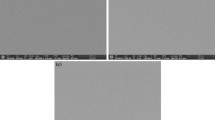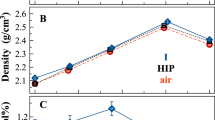Abstract
IN addition to using sodium sulphate in the classical manner to effect a separation of the light (cerium group) lanthanons, leaving the heavy group and yttrium in solution, I have found it advantageous to precipitate the whole of the 'soluble' double sulphates. This is achieved (except for the equivalent of 0·2 gm. per 1. of oxide) simply by salting out. In hot brine, solubilities of the yttrium group are reduced to less than 1 per cent of the minimum obtainable in practice with excess of sodium sulphate in hot aqueous solution.
This is a preview of subscription content, access via your institution
Access options
Subscribe to this journal
Receive 51 print issues and online access
$199.00 per year
only $3.90 per issue
Buy this article
- Purchase on Springer Link
- Instant access to full article PDF
Prices may be subject to local taxes which are calculated during checkout
Similar content being viewed by others
References
Int. Crit. Tables 4, 280, 287.
Ann., 352, 88 (1907).
Indust. Eng. Chem. Anal. Ed., 17, 44 (1945).
James and Holden J. Amer. Chem. Soc., 35, 559 (1913).
Author information
Authors and Affiliations
Rights and permissions
About this article
Cite this article
MARSH, J. Lanthanon (Rare-Earth) Sodium Sulphate Precipitations. Nature 163, 998–999 (1949). https://doi.org/10.1038/163998a0
Issue Date:
DOI: https://doi.org/10.1038/163998a0
Comments
By submitting a comment you agree to abide by our Terms and Community Guidelines. If you find something abusive or that does not comply with our terms or guidelines please flag it as inappropriate.



